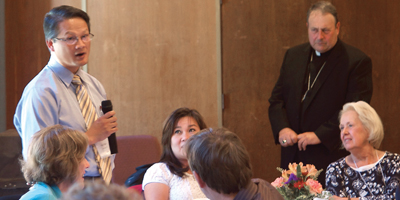
 CHARLESTON—A group of 50 Catholic physicians, nurses and other health care workers spent Oct. 23 celebrating their faith and profession during the first annual diocesan White Mass and luncheon held at the Cathedral of St. John the Baptist.
CHARLESTON—A group of 50 Catholic physicians, nurses and other health care workers spent Oct. 23 celebrating their faith and profession during the first annual diocesan White Mass and luncheon held at the Cathedral of St. John the Baptist.
The Mass, which takes its name from the conventional color worn by health care workers, is a tradition around the country.
During the lunch meeting, speakers addressed issues facing Catholics in the industry, including moral and ethical problems raised by recent legislation.
Bishop Robert E. Guglielmone welcomed the group and told them caring for the sick is not just a job, but a vocation that challenges the mind, heart and spirit.
“You are there to calm fears for people, and you deal with the whole spectrum of the rhythm of life,” he said. “You deal with intense joy and intense sorrow. It is not an easy life, yet the rewards are tremendous.”
The bishop said it was important for the professionals to have a support network where they can strengthen their faith and discuss the challenges of living in a culture that promotes abortion, contraception and other issues in opposition to church teaching.
Dr. Peter Bleyer, a family practice physician from Longs, spoke about “Christ-like Medical Care and the Role of Catholic Medical Guilds.” He is president of the newly-chartered Blessed Clemens August von Galen Medical Guild, which currently has 11 members.
Bleyer gave an overview of the history of medicine, the Hippocratic oath, and how both the doctor-patient relationship and the physician’s traditional commitment to preserve life have been eroded.
He said the role of truly Catholic physicians took a hit after the development of the birth control pill and the resulting controversy when Pope Paul VI wrote “Evangelium Vitae” in 1968, which reinforced the church’s stance against contraception.
He said there were 100 Catholic medical guilds nationwide in 1967 with 10,000 members, but enrollment quickly dropped to about two guilds with 300 members because many physicians disagreed with the teaching on birth control.
“There was disappointment because the Catholic Church in America used to stand for something, and contraceptives made Catholics just like everybody else,” he said.
In recent years, however, he said enrollment in guilds is increasing.
“People are seeing the power of following Christ in their practice,” he said.
Dr. Mark O’Rourke, a Greenville oncologist, discussed the ethical challenges physicians face when dealing with end-of-life issues, and presented five steps that can help patients, doctors and family members fully understand a diagnosis and plan a course of treatment.
Dr. Melvin Hecker, an emergency room physician from Conway, and Dr. Bowen Truluck, a Myrtle Beach cardiologist, spoke on the importance of having Catholic views represented on hospital ethics committees.
Father Jeffrey F. Kirby, diocesan vicar for vocations, spoke on “A Catholic Approach to Human Dignity and Suffering.” He said his first assignment as a priest involved ministry to the sick and dying, and sometimes it seemed too much to bear. The priest learned that assisting people through illness or the dying process was a part of helping them live a sacramental life.
Agnes Edwards, a social worker for Georgetown Hospital System and a member of St. Cyprian Church, said she would be able to apply many of the topics to her work, such as information about advance directives and dealing with ethics committees.
Dr. Hiep Phan, medical director of geriatric and palliative care at Greenville Memorial Hospital, said he deals with issues such as commitment to preserving life and dignity daily.
“For me, being a Catholic provider means showing my faith through being there with my patients,” he said. “We don’t evangelize directly to them, but we walk with our patients on their journey.”
